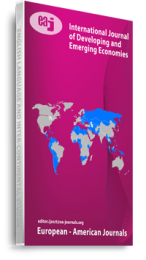Theoretically, and indeed empirically it has been postulated that Exchange Rate fluctuations has had a significant effect on manufacturing performance in terms of output growth and contribution to the Gross Domestic Product (GDP). This study aimed to examine the Exchange Rate fluctuations on manufacturing performance in Nigeria over a period of 37 years (from 1981-2018), using annual data obtained from collected from CBN, NBS and Index Mundi Nigeria. An ARDL approach was used for the analysis. The empirical results of the study shows that an exchange rate volatility has negatively affect the performance of the Nigerian manufacturing sector as can be seen from the from the respective coefficients of the estimated variables, , the long run relationship analysis and the causal relationship between the dependent and the independent variables. The study recommends encouraging and improving exchange rate stability in Nigeria as this may help improve the capacity of the country’s manufacturing sector, hence expand its contribution to GDP growth.
Keywords: Nigeria, ardl model, economic growth, exchange rate fluctuations, manufacturing performance

